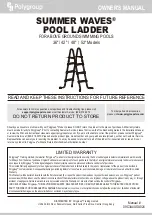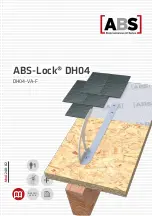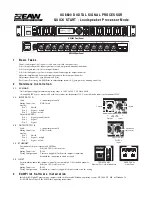
Should you encounter any problems, contact Customer Service at (888) 919-0070 from 8AM to 5PM MST, Monday-Friday.
Extended operating days and hours during peak season requirements.
4
Ladder
1. The ladder shall be located on a solid base and the ladder shall be installed per the manufacturer’s instructions.
2. One person on the ladder/stair at a time.
3. This ladder is designed and manufactured for a specific pool wall height and/or deck of the pool.
4. For entry/exit of pool, face the ladder at all times.
5. To prevent entrapment or drowning do not swim through, behind, or around ladder.
6. Remove and secure ladder when pool is not occupied.
7. Instruct pool users about the proper use of all pool ladder(s) and staircases.
8. Check all nuts and bolts regularly to ensure that the ladder stays sturdy.
Drowning Risk
1. Keep unsupervised children from accessing the pool by installing fencing or other approved barrier around all sides of pool. State or local laws or codes may require
fencing or other approved barriers. Check state or local laws and codes before setting up pool.
2. Remove pool ladders before leaving the pool. Children as young as 2 years have climbed up ladders and into pools and drowned.
3. Toys, chairs, tables or similar objects that a young child could climb shall be at least four feet (4’) [121.92 cm] from the pool. The pump filter system shall be positioned
so as to prevent it from being used as a means of access to the pool by young children. Do not leave toys inside pool when finished using, since toys and similar
items might attract a child to the pool.
4. Position furniture (for example, tables, chairs) away from pool and so that children cannot climb on it to gain access to the pool.
Diving Risk
1. Above ground/onground residential swimming pools are for swimming and wading only. No diving boards, slides or other equipment are to be added to an above
ground/onground pool that in any way indicates that an above ground/onground pool may be used or intended for diving or sliding purposes.
2. Do not dive into this pool. Diving into shallow water can result in a broken neck, paralysis, or death.
First Aid
1. Keep a working phone and a list of emergency numbers near the pool.
2. Become certified in cardiopulmonary resuscitation (CPR). In the event of an emergency, immediate use of CPR can make a lifesaving difference.
Special Warning
1. Local building codes may require obtaining a building or electrical permit. Installer shall follow regulations on setback, barriers, devices and other conditions.
2. Safety signs shall comply with requirements of ANSI-Z535 and to use signal wording.
3. DO NOT attempt to assemble this pool in adverse weather conditions, windy conditions or when the temperature is below 60°F.
4. This is a storable pool, which should be disassembled and stored when temperatures are expected to fall below 32°F.
Extra Safety Warning
1. Adult supervision is always required.
2. Parents should learn CPR.
3. Keep all electrical radios, speakers and other appliances away from the swimming pool.
4. Keep all breakable objects out of the pool area.
5. Do not install on a deck or other surface at, above, or slightly below the top rail of the pool.
6. Do not allow diving, climbing, sitting, or standing on the top rails of the pools.
7. Do not allow roughhousing and horseplay.
8. Install a pool ladder(s) or staircase for entry and exit from the pool.
9. Face ladder going up or down.
10. Please contact pool site dealer or manufacturer for additional safety signs if deemed necessary.
11. For pool service, select a certified pool professional. For additional safety information, see www.APSP.org
Consumer Awareness Booklets and Information Source
Contact: U.S. Consumer Product Safety Commission at www.cpsc.gov/safety-education/safety-guides/pools-and-spas, Pub. #362 “Safety Barrier Guidelines for Home Pools.”
1. The Sensible Way to Enjoy Your Aboveground/Onground Swimming Pool.
2. Children Aren’t Waterproof.
3. Layers of Protection.
4. Pool and Spa Emergency Procedures for Infants and Children.
5. Be Safety Aware.
Copies of the above brochures are available free from the APSP at www.APSP.org





































